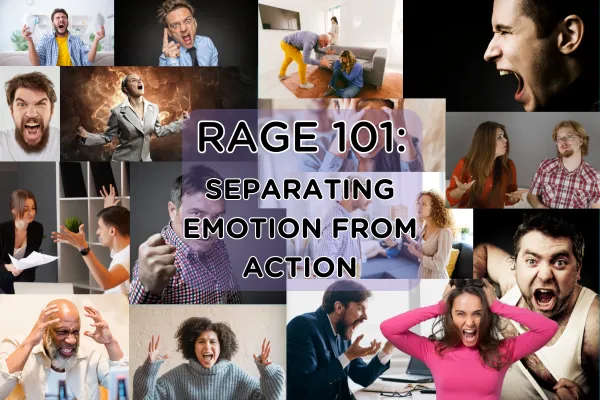General Inquiries: (587) 333-6349 - info@sanostate.com



Rage 101: Separating Emotion from Action
“...it isn’t anger itself that is inherently the problem.” - Kayla Taylor
Are you dealing with anger the wrong way? Anger is a natural and normal human emotion and does, in fact, have a function within our nervous system; it is a response to perceived threats. Think about it… back in the days of hunting and gathering, if a predator snuck up on you and was about to attack, anger (or the ‘fight’ response in fight, flight, or freeze) was one of the surest ways to protect yourself.
Anger has also been conceptualized as a social emotion: it often gets directed at someone or happens in the context of a relationship. It can also be understood as a secondary emotion, meaning that there are other, more primary emotions at play—perhaps under the surface of our consciousness—. Yet, anger is expressed (see the diagram below of an anger iceberg analogy).

Even though anger doesn’t always feel good and can have detrimental effects on our relationships if not handled in the healthiest way… it isn’t anger itself that is inherently the problem. What can be problematic are behaviours associated with anger.
To be clear, it is okay to feel angry. But it is not okay to hurt yourself, others, or property. Do you see the difference? The emotion is okay. The behaviours that result may not be. Let’s try to keep the two separate.
And then, after an angry feeling has passed and you have coped with that in some fashion, what can help? Well, I can tell you what actually doesn’t help first…
There is a widely held belief in society that venting helps you release anger or feel better. You might have heard it referred to as being cathartic. Freud believed that if we repress our anger, it will develop into hysteria (i.e., emotionally charged/uncontrolled behaviour), but this has not been widely supported in the literature. Actually, the research has shown that the opposite (expressing anger) is quite maladaptive. For example, venting anger or doing violent things to deal with anger (e.g., hitting inanimate objects, even though safer than hitting real-life objects) results in a negative reinforcement process.
Basically, venting and violence begets more of the same.
Remember the old saying, “neurons that fire together wire together”? This was coined by psychologist Donald Hebb in 1949 to explain how pathways in the brain are created and strengthened through repetition. It helps us understand how the more we vent (or complain, express hostility toward others, etc.), the more ingrained those neural networks become, and the more quickly they are accessed (or defaulted to) next time.
What can help?
So venting doesn’t work, but it is not healthy to completely suppress emotions either…
To effectively regulate emotions, we need:
Emotional Awareness (attention to the emotion and clarity around the emotion)
Behaviours to support that awareness
Here are some tips on how to engage in both:
Using validating and compassionate self-talk:
Example: “AGH!! This is so frustrating. Why is this making me so angry? I don’t feel understood or cared about… no wonder this hurts.”
Identifying causes of your anger:
"Why is this so irritating? I think this is making me angry because I actually feel rejected and helpless right now too.”
Taking a break from the triggering circumstance:
“I need a break.” [take a deep breath and walk away]
Replacing one activity for another, more regulating one:
“I know some quiet time will help; I will ask for a break and go listen to my relaxing music for a bit.”
If you do share your thoughts and feelings with another person, summarize the events instead of giving a play-by-play and ruminating on the feelings for an extended period of time. Consider sharing what helped as well.
Notice that the first two tips involve emotional awareness and clarity, while the last three involve behavioural changes to support that awareness. Both factors are at play.
After an angry feeling has dissipated a bit, remember it can still be helpful to take time to reflect on it, even if that feels uncomfortable. When you feel it, ask yourself, “What is feeling threatening right now?”
It can be challenging to break the cycle of venting or resorting to hostility when angry. However, next time you are tempted to spout angry criticisms aloud to an innocent listener or tell your child just to hit the pillow to let their out, consider this article and try the suggestions above.
Remember: You can learn to regulate your anger and not let your anger control you!
If this an area where you could benefit from support please click HERE to connect or call 587-333-6349. 💙
Disclaimer
Our content is for informational and educational purposes and is not a replacement for professional advice, diagnosis, or treatment. If you're facing mental health concerns, please seek help from a qualified professional for personalized guidance. Every individual's situation is unique, so use the information here at your discretion. While we strive for accuracy, the field of psychology is ever-evolving, and our content may not always reflect the latest research. Please prioritize your privacy by avoiding sharing personal information in comments or interactions. Your well-being is our top concern, so use our content for educational purposes, but remember to rely on professionals for your specific needs.
References
Bushman, B. J. (2002). Does Venting Anger Feed or Extinguish the Flame? Catharsis, Rumination, Distraction, Anger, and Aggressive Responding. Sage Journals. https://journal
s.sagepub.com/doi/10.1177/0146167202289002
Miller, H. A. (2021, June 1). Understanding the psychology of anger and secondary emotions. Family Psychiatry & Therapy. https://familypsychnj.com/2021/06/understanding-the-psychology-of-anger-and-secondary-emotions/
Moroń, M., & Biolik-Moroń, M. (2021). Emotional awareness and relational aggression: The roles of anger and maladaptive anger regulation. ScienceDirect. https://doi.org/10.1016/j.paid.2021.110646
Olatunji, B. O., Lohr, J. M., & Bushman, B. J. (2007). The pseudopsychology of venting in the treatment of anger: Implications and alternatives for mental health practice. American Psychological Association Psych Net. https://psycnet.apa.org/record/2006-21781-005
The Wellness Society, T. (2018). Anger iceberg + free anger worksheets - the wellness society: Self-help, therapy and coaching tools. The Wellness Society | Self-Help, Therapy and Coaching Tools. https://thewellnesssociety.org/anger-iceberg-pdf-free-anger-worksheets/
General Inquiries:
Our Locations:
Additional Resources:
About Us:
We strive for excellence in psychological treatment. We are committed to providing professional, caring, innovative, and research-based services.
© 2024 Sano State Taylored Psychology. All Rights Reserved.

